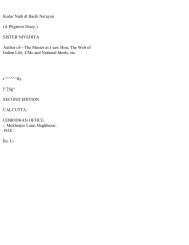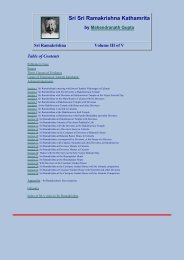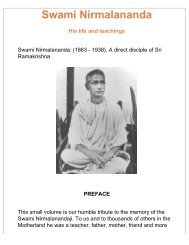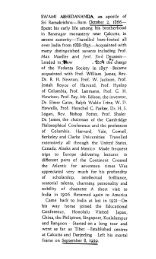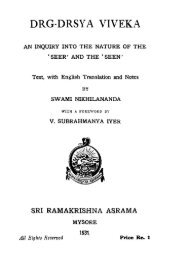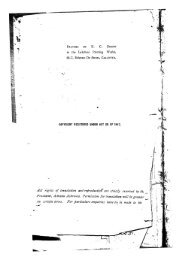<strong>Practical</strong> <strong>Vedanta</strong>that test. If that God is outside of nature, having nothing to do with nature, and thisnature is the outcome of the command of that God and produced from nothing, itis a very unscientific theory, and this has been the weak point of every Theisticreligion throughout the ages. These two defects we find in what is generally calledthe theory of monotheism, the theory of a Personal God, with all the qualities of ahuman being multiplied very much, who, by His will, created this universe out ofnothing and yet is separate from it. This leads us into two difficulties.As we have seen, it is not a sufficient generalization, and secondly, it is not anexplanation of nature from nature. It holds that the effect is not the cause, that thecause is entirely separate from the effect. Yet all human knowledge shows that theeffect is but the cause in another form. To this idea the discoveries of modernscience are tending every day, and the latest theory that has been accepted on allsides is the theory of evolution, the principle of which is that the effect is but thecause in another form, a readjustment of the cause, and the cause takes the form ofthe effect. The theory of creation out of nothing would be laughed at by modernscientists.Now, can religion stand these tests? If there be any religious theories which canstand these two tests, they will be acceptable to the modern mind, to the thinkingmind. Any other theory which we ask the modern man to believe, on the authorityof priests, or churches, or books, he is unable to accept, and the result is a hideousmass of unbelief. Even in those in whom there is an external display of belief, intheir hearts there is a tremendous amount of unbelief. The rest shrink away fromreligion, as it were, give it up, regarding it as priestcraft only.Religion has been reduced to a sort of national form. It is one of our very bestsocial remnants; let it remain. But the real necessity which the grandfather of themodern man felt for it is gone; he no longer finds it satisfactory to his reason. Theidea of such a Personal God, and such a creation, the idea which is generallyknown as monotheism in every religion, cannot hold its own any longer. In India itcould not hold its own because of the Buddhists, and that was the very point wherethey gained their victory in ancient times. They showed that if we allow thatnature is possessed of infinite power, and that nature can work out all its wants, itis simply unnecessary to insist that there is something besides nature. Even thesoul is unnecessary.The discussion about substance and qualities is very old, and you will sometimesfind that the old superstition lives even at the present day. Most of you have readhow, during the Middle Ages, and, I am sorry to say, even much later, this wasone of the subjects of discussion, whether qualities adhered to substance, whetherlength, breadth, and thickness adhered to the substance which we call dead matter,whether, the substance remaining, the qualities are there or not. To this ourBuddhist says, "You have no ground for maintaining the existence of such asubstance; the qualities are all that exist; you do not see beyond them." This is justthe position of most of our modern agnostics. For it is this fight of the substanceand qualities that, on a higher plane, takes the form of the fight betweenfile:///C|/Documents%20and%20Settings/Chitra%20Selva...oksBySwami/<strong>Practical</strong><strong>Vedanta</strong>/<strong>Practical</strong><strong>Vedanta</strong>PDF.html (24 of 113)2/26/2007 12:24:33 AM
<strong>Practical</strong> <strong>Vedanta</strong>noumenon and phenomenon. There is the phenomenal world, the universe ofcontinuous change, and there is something behind which does not change; and thisduality of existence, noumenon and phenomenon, some hold, is true, and otherswith better reason claim that you have no right to admit the two, for what we see,feel, and think is only the phenomenon. You have no right to assert there isanything beyond phenomenon; and there is no answer to this. The only answer weget is from the monistic theory of the <strong>Vedanta</strong>. It is true that only one exists, andthat one is either phenomenon or noumenon. It is not true that there are two —something changing, and, in and through that, something which does not change;but it is the one and the same thing which appears as changing, and which is inreality unchangeable. We have come to think of the body, and mind, and soul asmany, but really there is only one; and that one is appearing in all these variousforms. Take the well-known illustration of the monists, the rope appearing as thesnake. Some people, in the dark or through some other cause, mistake the rope forthe snake, but when knowledge comes, the snake vanishes and it is found to be arope. By this illustration we see that when the snake exists in the mind, the ropehas vanished, and when the rope exists, the snake has gone. When we seephenomenon, and phenomenon only, around us, the noumenon has vanished, butwhen we see the noumenon, the unchangeable, it naturally follows that thephenomenon has vanished. Now, we understand better the position of both therealist and the idealist. The realist sees the phenomenon only, and the idealistlooks to the noumenon. For the idealist, the really genuine idealist, who has trulyarrived at the power of perception, whereby he can get away from all ideas ofchange, for him the changeful universe has vanished, and he has the right to say itis all delusion, there is no change. The realist at the same time looks at thechangeful. For him the unchangeable has vanished, and he has a right to say this isall real.What is the outcome of this philosophy? It is that the idea of Personal God is notsufficient. We have to get to something higher, to the Impersonal idea. It is theonly logical step that we can take. Not that the personal idea would be destroyedby that, not that we supply proof that the Personal God does not exist, but we mustgo to the Impersonal for the explanation of the personal, for the Impersonal is amuch higher generalization than the personal. The Impersonal only can be Infinite,the personal is limited. Thus we preserve the personal and do not destroy it. Oftenthe doubt comes to us that if we arrive at the idea of the Impersonal God, thepersonal will be destroyed, if we arrive at the idea of the Impersonal man, thepersonal will be lost. But the Vedantic idea is not the destruction of the individual,but its real preservation. We cannot prove the individual by any other means butby referring to the universal, by proving that this individual is really the universal.If we think of the individual as separate from everything else in the universe, itcannot stand a minute. Such a thing never existed.Secondly, by the application of the second principle, that the explanation ofeverything must come out of the nature of the thing, we are led to a still bolderfile:///C|/Documents%20and%20Settings/Chitra%20Selva...oksBySwami/<strong>Practical</strong><strong>Vedanta</strong>/<strong>Practical</strong><strong>Vedanta</strong>PDF.html (25 of 113)2/26/2007 12:24:33 AM
- Page 1 and 2: Practical VedantaPractical VedantaP
- Page 3 and 4: Practical Vedantaworld. If I am a s
- Page 5 and 6: Practical Vedantadifference is only
- Page 7 and 8: Practical VedantaThe ideal of faith
- Page 9 and 10: Practical Vedantamoment of our live
- Page 11 and 12: Practical Vedantaof the Christs and
- Page 13 and 14: Practical Vedanta"This life is Brah
- Page 15 and 16: Practical Vedantadark fifteen days,
- Page 17 and 18: Practical Vedantalife. This is the
- Page 19 and 20: Practical Vedantaeverything would b
- Page 21 and 22: Practical Vedantait is only through
- Page 23: Practical Vedantawhich is that subt
- Page 27 and 28: Practical Vedantato which is the be
- Page 29 and 30: Practical VedantaAbsolute.The finit
- Page 31 and 32: Practical Vedantawhich is not the q
- Page 33 and 34: Practical Vedantaexperience that th
- Page 35 and 36: Practical Vedantafulfilled. The Jiv
- Page 37 and 38: Practical Vedantabetween the pure r
- Page 39 and 40: Practical Vedantacome out straight.
- Page 41 and 42: Practical Vedantawar with one anoth
- Page 43 and 44: Practical Vedantanobody could under
- Page 45 and 46: Practical VedantaMy idea, therefore
- Page 47 and 48: Practical Vedantathe same methods.
- Page 49 and 50: Practical Vedantavarious minds, all
- Page 51 and 52: Practical Vedantabrotherhood; but t
- Page 53 and 54: Practical Vedantabrotherhood, but w
- Page 55 and 56: Practical Vedantawe all go with ves
- Page 57 and 58: Practical Vedantareason. What can y
- Page 59 and 60: Practical Vedantabeen preached in t
- Page 61 and 62: Practical Vedantathe husband kisses
- Page 63 and 64: Practical Vedantaof the knowledge a
- Page 65 and 66: Practical Vedantafor those who only
- Page 67 and 68: Practical Vedantasun exists because
- Page 69 and 70: Practical Vedantaof death was pleas
- Page 71 and 72: Practical VedantaGod. We must learn
- Page 73 and 74: Practical Vedantaa plague comes, it
- Page 75 and 76:
Practical VedantaAtman? "As with a
- Page 77 and 78:
Practical Vedantathat immortal One,
- Page 79 and 80:
Practical Vedantaand the third egoi
- Page 81 and 82:
Practical VedantaWitness of the uni
- Page 83 and 84:
Practical VedantaPractical Vedanta1
- Page 85 and 86:
Practical Vedantaeternal ; every ot
- Page 87 and 88:
Practical Vedantafaculty, Buddhi, w
- Page 89 and 90:
Practical VedantaPractical Vedanta1
- Page 91 and 92:
Practical Vedantastepping-stone to
- Page 93 and 94:
Practical Vedantarecognition? Findi
- Page 95 and 96:
Practical Vedantasentient." This is
- Page 97 and 98:
Practical Vedantaessentially differ
- Page 99 and 100:
Practical Vedantaexistence is limit
- Page 101 and 102:
Practical Vedantalive, for I am lif
- Page 103 and 104:
Practical Vedantasee from Kapila's
- Page 105 and 106:
Practical Vedantalimitation, but th
- Page 107 and 108:
Practical Vedantaperfect, infinite,
- Page 109 and 110:
Practical Vedantaindividuality, of
- Page 111 and 112:
Practical Vedantarepeat [something]
- Page 113:
Practical Vedantaperson who dies in




